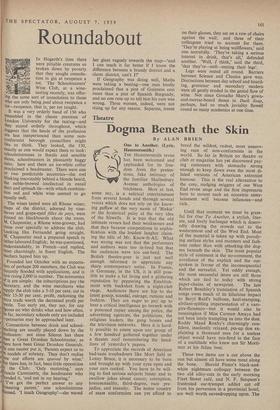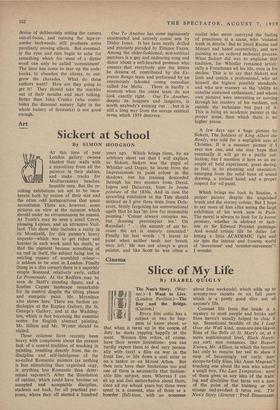Theatre
Dogma Beneath the Skin
By ALAN BRIEN
THE Hammersmith revue has been welcomed and applauded for its free- dom from the preten- tious, fake intimacy of the familiar Shaftesbury Avenue anthologies of bitchiness. Here at last, some say, is a satirical entertainment from several hands and through several voices which does not rely on the know- ing guffaw at the very name of 'Binkie' or the hysterical palsy at the very idea of the Sitwells. It is true that the old intimate revues had their weaknesses and that they became competitions in sophis- tication with the loudest laugher claim- ing the title of Mr. Know-It-All. What was wrong was not that the performers and authors were too in-bred but that the audiences were too out-bred. The British theatre-goer is just not well enough informed to appreciate any sharp contemporary satire. In France, in Germany, in the US, it is still poss- ible to make a fat living and a glittering reputation by peppering the Establish- ment with buckshot from a night-club stage. Audiences there are hip to the latest gossip, scandal, outrage, rumour and fashion. They are eager to pay up to hear a critical intelligence go berserk with a poisoned rapier among the police, the advertising agencies, the politicians, the religious leaders, the gang bosses and the television networks. Here it is hard- ly possible to count upon any group of a few hundred gathered together under a theatre roof remembering the head- lines of yesterday's papers.
To appreciate the records of American bad-taste troubadours like Mort Sahl or Lenny Bruce, it is necessary to be born and brought up with your eyes open and your ears cocked. You have to be will- ing to find serious subjects funny and to swallow jokes about cancer, corruption, homosexuality, third-degree, race pre- judice, and insanity. The home country of mass conformism can yet afford to breed the wildest, rudest, most unnerv- ing race of non-conformists in the world. So far in Britain no theatre or club or magazine has yet discovered pay- ing customers with stomachs strong enough to keep down even the most di- luted versions of American extremist humour. This is the real alternative to the cosy, nudging sniggers of our West End revue stage and the first impresario here to mount such an eccentric enter- tainment will become infamous—and rich.
Until that moment we must be grate- ful for One To Another, a stylish, liter- ate, and lively burlesque which is deserv- edly drawing the crowds out to the westernmost end of the West End. Most of the material is taken up with parody- ing surface styles and manners and fash- ions rather than with attacking .the dog- ma beneath the skin. The most popular style of comment is the no-comment, the avoidance of the explicit and the out- spoken in favour of the inconsequential and the surrealist. Yet oddly enough, the most successful items are still those which are tied to today with strong paper-chains of newsprint. The late Robert Benchley's translation of Spanish songs owes much of its hilarious impact to Beryl Reid's bulbous, heel-stamping, sibilant-spitting impersonation of a vam- pire-flamenco—but it would also be meaningless if Miss Carmen Amaya had not been lately trampling us into the dust. Roddy Maud Roxby's charmingly con- fident, insolently relaxed, pin-up don ex- plaining a thousand uses for a useless object would have mis-fired in the face of a multitude who knew not Sir Morti- mer at his feline best.
These two items are a cut above the rest but almost all have some meat along
the bone. Harold Pinter's black-and- white nightmare colloquy between the two old alley-cats in the early morning Fleet Street café, and N. F. Simpson's frustrated ear-trumpet addict cut off from his perversion in a provincial hotel, are well worth eavesdropping upon. The
device of deliberately setting the camera out-of-focus, and running the tape-re- corder backwards, still produces some peculiarly moving effects. But eventual- ly the eyes and ears begin to ache for something which for want of a dirtier word can only be called 'commitment'. The time has come to tear up the code- books, to abandon the aliases, to out- grow the charades. What do these authors want? How are they going to get it? They should take the marbles out of their mouths and start talking. Better than John Cranko (who contri- butes the dimmest nursery light in the whole battery of fireworks) is not good enough.
One To Another has some ingeniously constructed and actively comic sets by Disley Jones. It has been neatly drilled and precisely paraded by Eleanor Fazan. Among the older-fashioned, non-satirical numbers is a gay and endearing song and dance about a soft-hearted postman who ensures that everybody gets the letters he dreams of, contributed by the Ex- presso Bongo team and performed by an enormously talented young comedian
called Joe Melia. There is hardly a moment when the entire team do not look exactly right. One To Another, despite its longeurs and languors, is worth anybody's evening out ... but it is still a long way from the savage satirical revue which 1959 deserves.



























 Previous page
Previous page